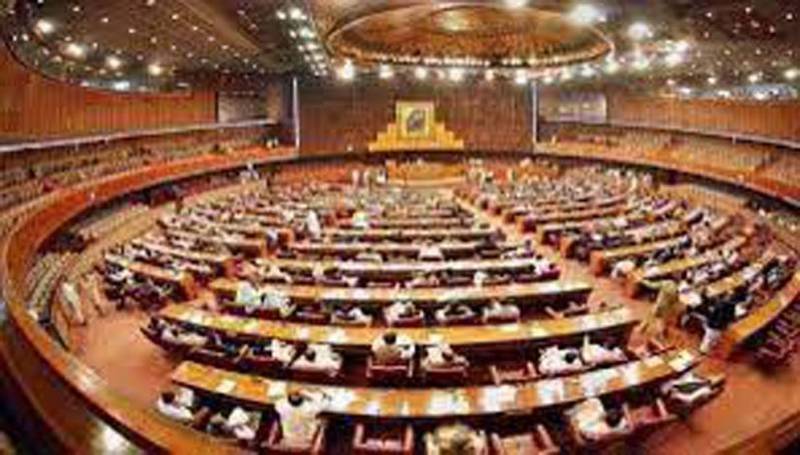| Election (Amendment) Bill-2022,
NAB (Second Amendment), Bill-2022 sail through NA | Opposition Leader Raja Riaz says idea of EVMs is not workable
ISLAMABAD - The coalition government in Thursday’s National Assembly sitting passed two important bills including the ‘Election (Amendment) Bill, 2022’ and ‘National Accountability Ordinance, 1999’ (NAO) by making necessary amendments.
The amendments in the ‘Election (Amendment) Bill 2022’ removed the use of Electronic Voting Machines (EVMs) in the general elections. The present government without facing any resistance from opposition benches smoothly approved all the amendments in both the important bills.
According to the amendment [in Section 94 of the Election Act, 2017] in the bill, proposed by Parliamentary Affairs Minister Murtaza Javed Abbasi, passed in the House, “the ECP may conduct pilot projects for voting by Overseas Pakistanis in by-elections to ascertain the technical efficacy, secrecy, security, and financial feasibility of such voting and shall share the results with the government, which shall, within 15 days from the commencement of a session of a house after the receipt of the report, lay the same before both houses of parliament.”
Another amendment in Section 103 of the Election Act, 2017, says “the ECP may conduct pilot projects for the utilisation of Electronic Voting Machines [EVMs] and biometric verification system in the by-elections.”
Sharing the reason to introduce the amendments Minister Azam Nazeer Tarar informed the House that the Election Commission of Pakistan (ECP) had also raised some objections to the use of the Electronic Voting Machine (EVM) but clarified the government was not against it.
The Minister also dispelled the impression that the amendments were aimed at depriving overseas Pakistanis of their right to vote. “Overseas Pakistanis are a precious asset of the country and the government does not believe in snatching their right to vote,” he said.
The Minister said that the PTI government made amendments to the ‘Election Act, 2017’ by allowing the use of ‘EVMs’ and granted overseas Pakistanis the right to vote in the general polls. “These amendments were made by bulldozing ‘the Elections (Second Amendment) Bill’ in the last year [Nov17, 2021].
“The proposed amendments would help ensure free, fair, and transparent elections,” he said, mentioning that they had examples of faulty Results Transmission System (RTS) which failed in the last general elections.
The lawmakers from opposition raised some objections over the bills, which were not entertained. They asked the reasons for hurriedly passing the bills without conducting debate on it.
Leader of the Opposition Raja Riaz Ahmed, speaking on the amendments, said that the idea of Electronic voting Machine (EVM) was not workable. “How it can be used in the areas without internet facilities,” he said.
MNA from Grand Democratic Alliance (GDA) Ghous Bux Mehar said that the EVM should at least be used in urban areas of the country. Another MNA from opposition benches Akbar Chitrali from Jamaat-e-Islami (JI) asked the government to avoid hurriedly passing the bill.
The house also approved amendment to National Accountability Ordinance, 1999 (NAO), which was presented by Minister for Parliamentary Affairs Minister Murtaza.
According to the amendments to NAB Ordinance, “NAB deputy chairman to become acting chairman following top official’s retirement,” It says, “Process to appoint new chairman to begin two months prior to incumbent’s retirement and completed in 40 days...NAB bound to ensure availability of evidence prior to arrest....Up to five-years imprisonment for filing false reference,”.
The process to appoint a new chairman would begin two months prior to the retirement of the incumbent chairman and would be completed in 40 days, according to the bill. If the prime minister and leader of the opposition are unable to agree on an appointee, the matter would be referred to the parliamentary committee.
According to the bill, the parliamentary committee would then finalise the name for a new chairman within 30 days.
According to the bill, the NAB deputy chairman would become the acting chairman following the top official’s retirement. If the deputy chairman is not available, any senior official would become the NAB’s acting chairman.
It further states that judges would be appointed in accountability courts for a three-year period and the relevant high court’s chief justice should be consulted for their removal. The courts would have to decide cases within a year.
Furthermore, the NAB would have to begin an investigation on a complaint within six months and present an arrested person before an accountability court within 24 hours. The anti-graft watchdog would have to ensure the availability of evidence prior to the arrest.
The period of remand would also be reduced from 90 days to 14 days. If convicted, a person would be able to file an appeal till 30 days instead of 10 days previously. The bill also seeks to stop NAB officials from issuing statements before a reference has been filed, the punishment for violating which would be one-year imprisonment and a fine of Rs100,000. The punishment for filing a false reference would be up to five-year imprisonment.
Commenting on the amendment in the law, the Minister for law remarked that the law had been used to influence the politicians. “Judges had also said that the NAB was used to corner politicians,” he said.






